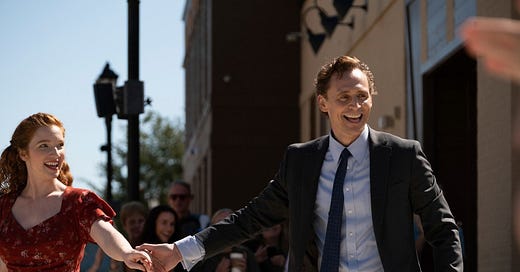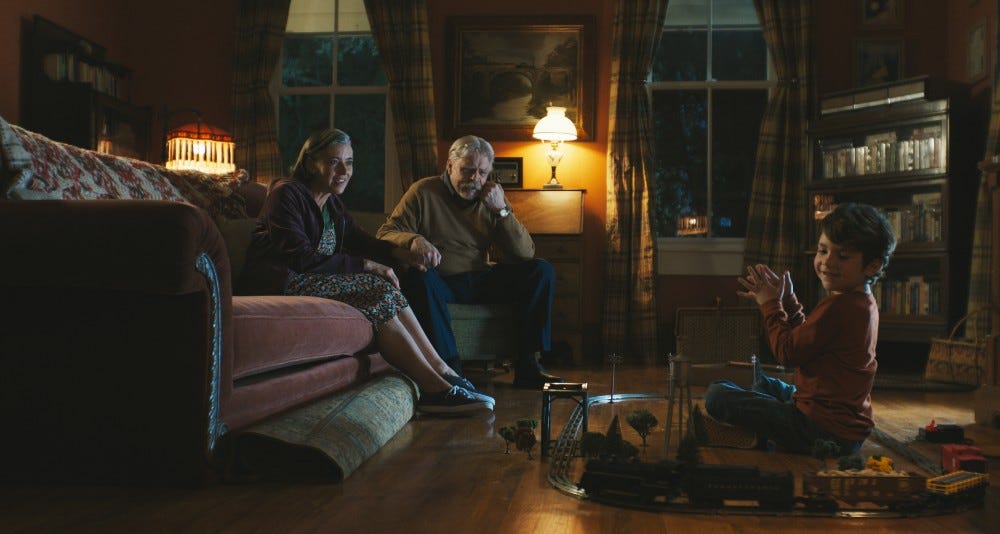THE LIFE OF CHUCK REVIEW
“One of King’s deepest and most philosophical concepts, and Flanagan continues to be the true master at bringing King to the screen.”
Directed by Mike Flanagan, The Life of Chuck is such an odd counterpart to Osgood Perkins’ The Monkey, despite both of them being based on short stories by Stephen King. This one is based on a much more recent collection from 2020, called “If It Bleeds,” and it’s pretty obvious this story was written by a far more mature author. I never read that collection before seeing this movie, and I also didn’t watch the trailer beforehand, which may or may not have given me more of an idea of what to expect, but it also could have made me think this might be a very different film. There’s something about Flanagan’s third adaptation of King that makes me want to try harder than usual not to give away too much, even though it’s hard to explain why the movie is so worthwhile and wonderful without getting into some of that stuff. Let’s see how I do.
Narrated by Nick Offerman, we’re introduced to several seemingly random characters, giving us a quick rundown of their lives in a way not unlike the comic writings of Neil Gaiman or Alan Moore. First up is Chiwetel Ejiofor’s Marty Anderson, a small town teacher whose class covering Walt Whitman is interrupted by the news that a massive earthquake has sent a piece of California plummeting into the sea. Soon, the internet has gone down while other horrifying natural disasters are popping up worldwide. Marty’s ex-wife Felicia Gordon (Karen Gillen, reuniting with Flanagan from his fantastic early horror film Oculus) is a doctor at a hospital dealing with the repercussions of all the destruction, as no one knows how to comprehend what is happening. Everyone also keeps seeing mysterious signs and ads thanking one Charles Krantz, aka “Chuck,” for 39 years of service, with no real explanation of who this person is.
A major decision made by King in his short story and followed by Flanagan’s adaptation is to begin this movie with Act III, aka “Thanks Chuck,” so we don’t even really meet Chuck or learn anything about what his connection is to the other characters. He’s just present as the universe starts blinking out. Act II gets even stranger, even as we finally do meet Chuck, as played by Tom Hiddleston, an accountant who happens upon drummer Taylor, busking at a mall (played by someone called “The Pocket Queen”). Chuck enigmatically begins to dance to her beat, asking a pretty stranger (Annalise Basso) to join him, as a crowd gathers and claps along. It’s a joyous moment that’s such an odd swerve from the third actor’s feeling of hopelessness, but it’s also possibly one of the greatest dance scenes since Pulp Fiction.
That section probably won’t make much sense until we cut back in time for Act 1, and we meet the younger Chuck (Benjamin Pajak), who is living with his grandparents (Mark Hamill, Mia Sara), and finally start seeing how some of the pieces come together. That’s where I’ll leave things as far as the plot, since there’s so much of the movie that works better when you’re left to figure out the connections for yourself. Let’s just say that the Walt Whitman poem being read in the beginning (end?) of the film plays a large role in how everything connects to Chuck. Make no mistake that few will expect where things end up.
In general, Flanagan’s cast is superb, although Ejiofor and Pajak are clear standouts along with Hiddleston. Still, I can also see anyone going to see the movie just for Hiddleston being disappointed. That dance sequence is fantastic, but he doesn’t have much to do in the third and first acts. I was expecting Jacob Tremblay to have a bigger role, but he, too, only appears in a very short segment at the end.
Even with so many interesting ideas about life and death (or maybe due to them), The Life of Chuck feels like a movie that could potentially be divisive. Some of the more negative reactions I’ve seen remind me of Dan Fogelman’s much-maligned drama Life Itself, a film I enjoyed that sports a shocking 13% Rating on Rotten Tomatoes. I haven’t seen that movie since it first came out, though I’m one of the few positive reviews. Still, it makes me wonder how many people will “get” Flanagan’s movie and be along for the ride, especially as it gets into its third act, which begins with the death of Chuck’s parents in a car crash and leads to other grim moments and a surprisingly joyous second dance sequence. (Both these sequences are choreographed by Emmy winner Mandy Moore, who I’m sure would win an Oscar if one was offered for choreography, and there really should be.)
It’s even more interesting when you start thinking of this movie in relation to Perkins’ The Monkey. Both movies deal with death, but while that movie was more about the gore and handled death humorously, Flanagan’s film is about grief and loss, handled in a far more grounded and relatable way. While hard to imagine that anyone can’t find some aspect of the film with which to connect.
Despite veering away from horror, this is one of Flanagan’s best films, up there with his early horror films like Oculus, with a screenplay that surely will allow him to branch away from horror, if he so chooses. And yet, the movie still deals with topics familiar to King readers, like the apocalypse (The Stand) and ghosts (The Shining). In other words, The Life of Chuck shows another side of King and Flanagan that includes so many things that connected with me, maybe because I am now older than when I first started reading King’s work in my teens, and as I become more interested in movies dealing with real life vs. fantastical horror tropes. Everything about the movie also just feels so original and fresh compared to everything else out there, and sometimes, that’s all a movie needs to do to win me over.
The Life of Chuck is easily one of King’s deepest and most philosophical concepts, and Flanagan continues to be a true master at bringing King’s words to the screen in a way that makes them truly ring. This is very likely to be in my Top 10 for the year.
Rating: 9/10
The Life of Chuck opens in limited release on June 6, then expands nationwide on June 13.





